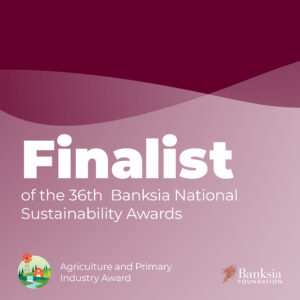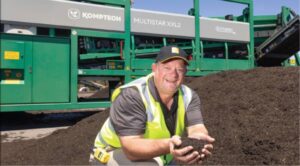Winners of the Infinity Awards 2014
The Shire of Capel and the City of Bunbury jointly won the Local Government category of the Waste Authority Infinity Awards for their introduction of a third bin for households to dispose of green waste, including food waste. This waste is processed at a regional council-owned facility in Dardanup and the bins have increased waste diversion and enabled the production of high-quality compost.
The infinity awards are made by the Government of WA through the Waste Authority WA and provide recognition for organisations and individuals demonstrating innovation, commitment and dedication to recycling and re-use of resources. Essentially it’s about encouraging closed loop systems where consumer and industrial waste is collected, treated and used to manufacture new goods which are then purchased by consumers. The infinity symbol is a visual example of a closed loop and that’s why it was chosen to represent the recycling and sustainability goals of the Waste Authority awards.
The City of Bunbury has hit a bit of a purple patch recently with two other awards falling into their lap, all connected to their innovative approach to processing green and food waste. They picked up the State’s Keep Australia Beautiful Star Award which aims to reward the best community doing work with waste management and sustainability. The city was complimented on the three bin system that diverts organic waste from going to landfill and produces a high quality compost that is being used by the council gardeners and commercial landscapers to beautify parks and gardens around the area. In twelve months over 10,000 tonnes of organic waste was processed saving in excess of 17,000 tonnes of CO2 emissions; the equivalent of taking 4300 cars off the road.
The third accolade in three weeks came from the Tidy Towns Sustainability Award where Bunbury won the waste management and litter prevention category for the SW region and will advance to
judging for the state award.
At the heart of the recycling work at Bunbury is a composting technology called MAF which stands for Mobile Aerated Floor. This is a modular system of blowers which control and promote an even composting process and allow rapid and low odour processing of greenwaste including food waste. C-Wise a Mandurah based company provided the MAF units as well as intensive training in the composting process. Andy Gulliver from C-Wise supervised the initial installation as well as guiding the operators through the first batch production.
One of the truly outstanding results of the Bunbury waste model is the low levels of contamination. Typically food waste is polluted with soft and hard plastic packaging. These materials are not broken down in the system and persist through to the final product, being compost and mulch for use in gardens. The more contamination the lower the value of these final products. If this is too great then contamination can render the products unusable.
Other Australian local authorities have implemented third bin systems for green and food waste. Most aim for 6% contamination by weight but some recordings show a level around 10%. A recent audit of trucks from Bunbury and Capel yielded 2% and 3% contamination level respectively.
Results like these don’t just happen by accident. Donnybrook, the third township in the regional waste group, will receive their organics bins on the 1st of December. Workshops on how to use the bins, the bin collection roster, what goes in which bin etc. will be held during November and December to bring householders, industry and community groups on board. There is a local media blitz that precedes the introduction and the two education officers for the Wellington Regional Waste will be addressing people in shopping centres and at local events such as the Balingup Spring Gala. Overwhelmingly the public want to do the right thing so the main goal of the introduction process is to inform.







